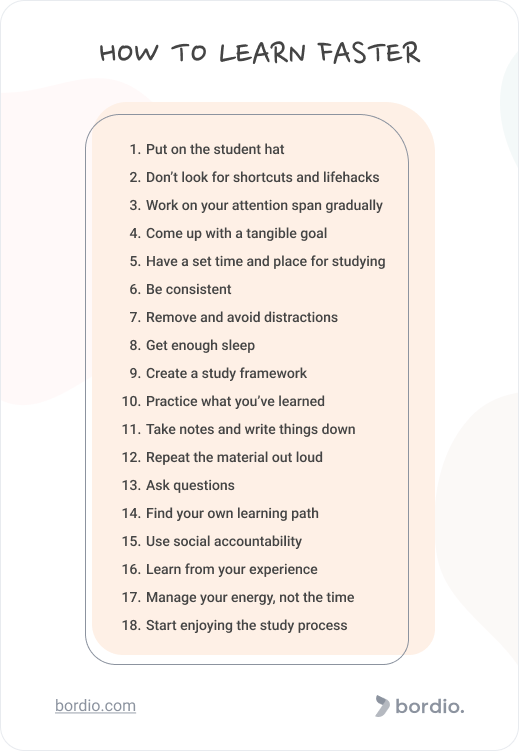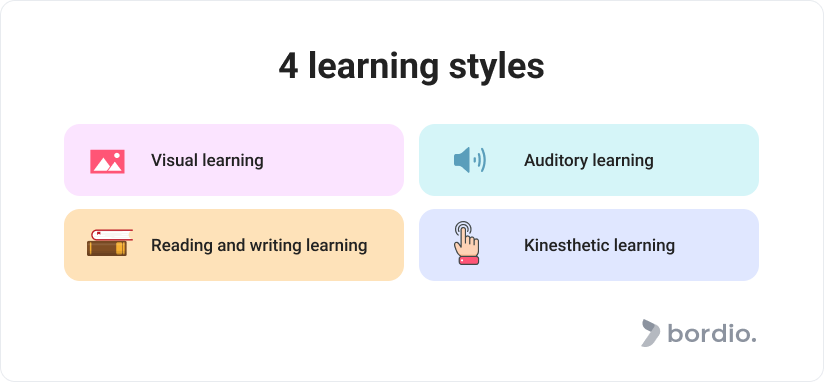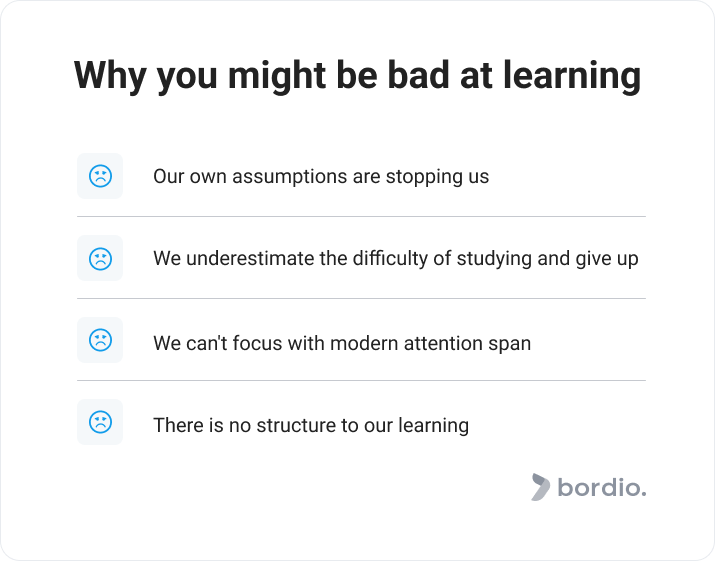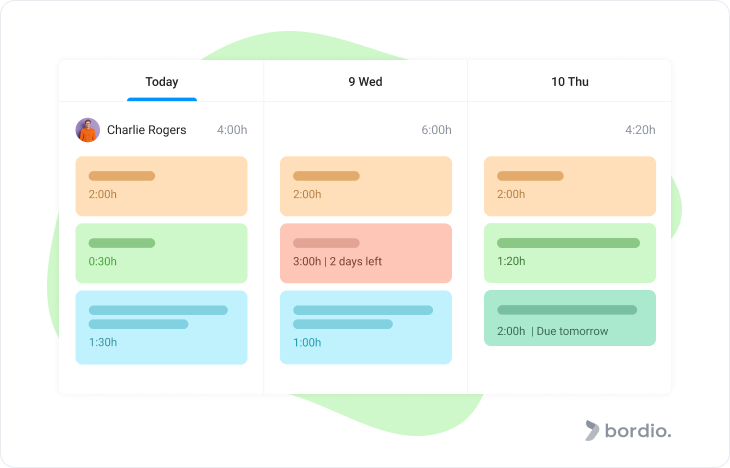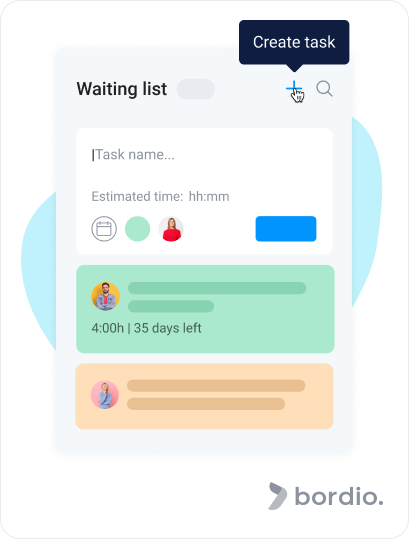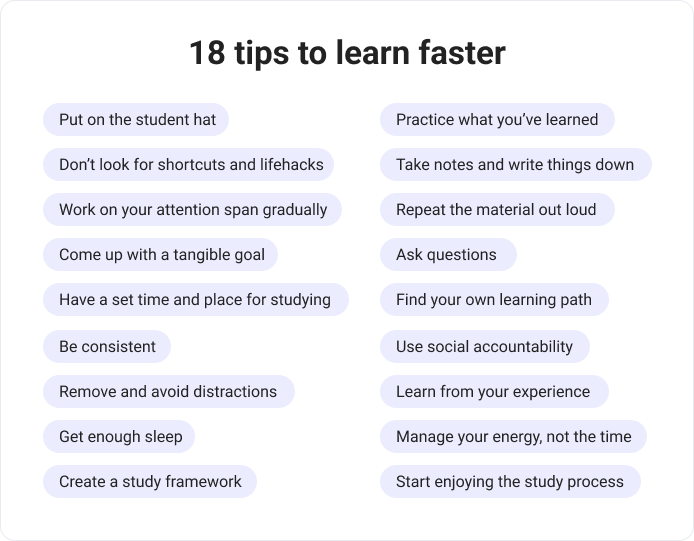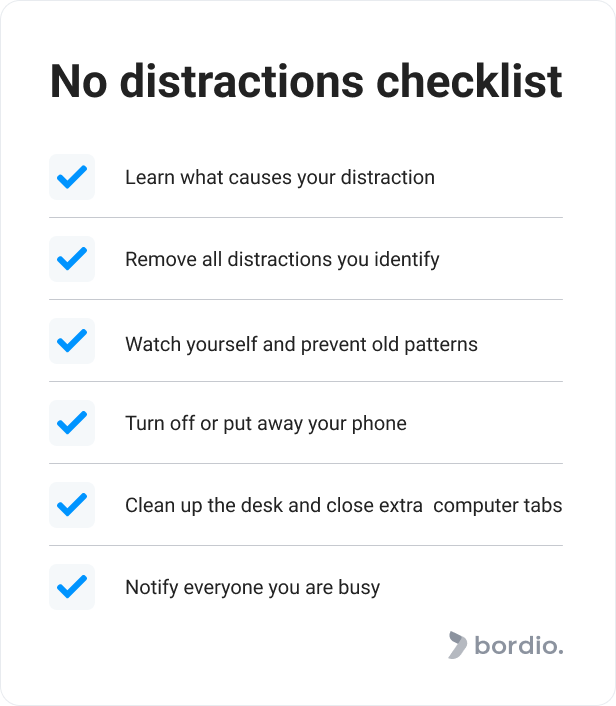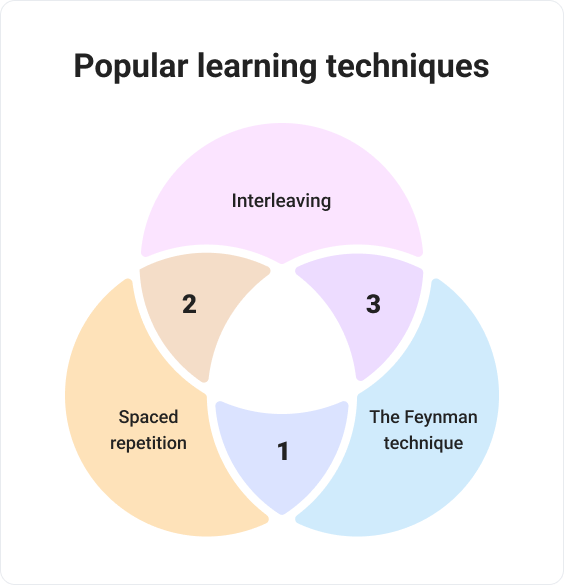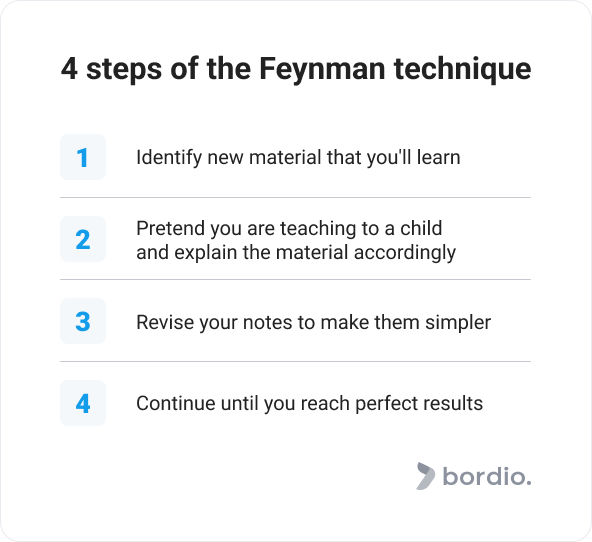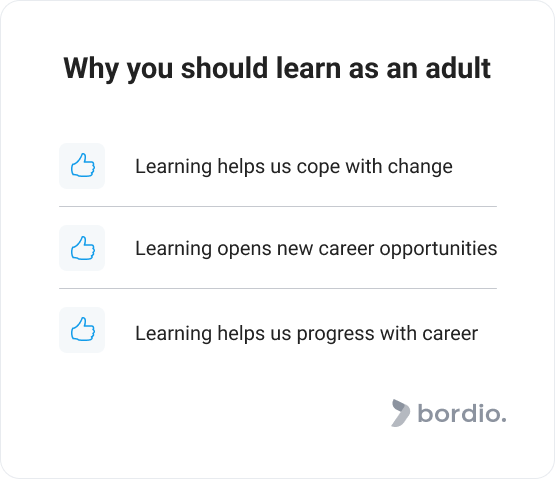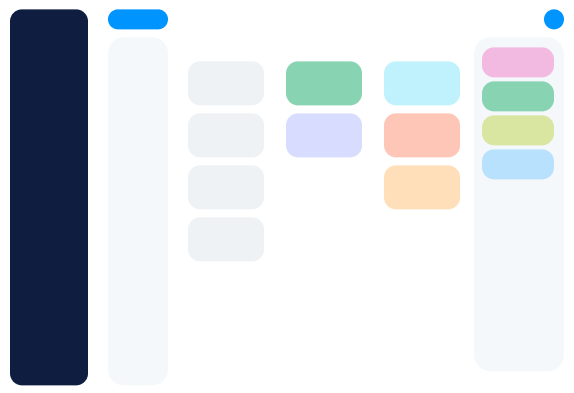Learning is a great activity that makes us more knowledgeable, stimulates brain activity, and supports us in our growth.
Yet, not all learning is efficient and positive. You can spend hours learning something and accomplish only a little. If that happens to you, don’t be demotivated to learn or discouraged from it. Perhaps you didn’t know about tricks to learning better.
Lucky for you, we at Bordio are huge learning enthusiasts, and we are here to help with and share our insight on smart learning.
Different styles of learning
You’ve probably heard something about different learning styles already. Let’s go through the four main ones that are generally accepted and recognized:
- Visual learning is where the person watches presentations and videos, and anything else that can be seen.
- Auditory learning is, you guessed it, done by listening to something or someone. For example, you can listen to a lecture, a podcast, or an audiobook.
- Reading or writing learning works best for people who enjoy reading and have information easily imprinted on their minds as they are taking notes.
- Kinesthetic learning is also known as physical learning and requires movement or other action. For example, kids learn basic math with cubicles and other accessories that they move around. Adults use the kinesthetic learning style when they learn to drive a car.
You can lean towards one of the styles or benefit from their combination. For many people, a combination of multiple learning methods works better.
In any case, we recommend trying them all out to make sure you don’t discount something just because it sounds off to you.
Why are we bad at learning
If you struggle with learning and think that you are simply incapable of retaining new information – you are wrong.
Often, quite common reasons are behind your struggles:
We have assumptions that are hard to let go of. Those assumptions end up jeopardizing our studying. For example, you were told in your early years that math is hard, and engineering is even harder. So now, as an adult, you still hold this bias, and you convince yourself that it’s impossible for you to do the advanced studies in those fields, when, in fact, you could be talented and succeed if you didn’t self-deprecate.
On the opposite side, we might underestimate the difficulty of learning. Because don’t get us wrong, learning is hard, and if we think that learning something will be easy and fast (which is a common misconception with foreign languages) and then we’re proven wrong, we might struggle. It is true that you can do some surface-level learning rather easily in many disciplines. However, getting profound knowledge is impossible without breaking a sweat.
Another issue is the inability to focus for longer periods of time. Modern attention span makes us bad learners. All those 20-second TikTok videos, constant scrolling, and incoming information make us less focused and reduce our attention spans dramatically. There are many worrying reports from around the world about children struggling to finish a book or even a part of it because they keep on getting distracted.
One last potential reason for failing to study well is the lack of structure or framework for your learning process. Sporadic learning rarely results in good results and satisfaction.
If you don’t have a plan, i.e. where and how you will learn the subject, it will be much more difficult to master it. That’s why all schools, courses, and universities have study plans. They really help!
Tip: Use Bordio to create your own study plans. The online calendar planner is perfect for logging all tasks and deadlines. You can assign in the schedule planners and schedule time blocks to your tasks so that you always have enough time allocated to work on assignments.
Dump all your to-dos to the waiting list and schedule them in the schedule creator as the time goes on.
How to learn faster
Now that we’ve identified the key roadblocks that prevent you from excelling at your studies, let’s go through some of the best tried and tested tips to make your future learning sessions a raging success.
Go through the list, and identify the tips that you are already actively using and the ones you don’t. Start gradually implementing the ones that are new to you. You will see a shift in your learning sessions with time, so be patient and good luck!
#1 Turn on the student hat
We’ll say it: you need to overcome your ego sometimes.
Progress stops when we think we know everything, so stay open to the idea that you might be wrong or not know something. The best way to do that is to turn on the student mode. Two people can be sitting in a seminar and listening to the exact same thing, but have very different outcomes. One comes out of it with many insights and ideas, while the second person says it was a waste of their time.
The difference is just in their mindset and attitude. If you want to learn, you will learn. If you choose to be skeptical – you will come out without a single new idea in your head.
#2 Stop looking for shortcuts and don’t obsess over lifehacks
Anyone who’s been using the internet for a while has seen thousands of lifehack articles where you are promised a shortcut to success with this one trick. Sadly, those tricks don’t always work in real life.
Sometimes there are no innovative learning strategies that work, and there’s nothing you can do but sit and learn, the old-school way.
Let’s be honest – there is no way to learn a new language spending just 10 minutes a day. It’s a marketing message, that’s it. Instead of hoping for a quick solution or a magical pill that you can take and know everything all of a sudden, roll up your sleeves and prepare for a long ride.
Tip: If you are after sustainable and efficient tips and lifehacks, make sure you check out Bordio’s blog with countless articles, such as being productive at home and practical tips to saving time. And also don’t forget to try out our project management tools.
#3 Work on your attention span slowly
If you struggle with a short attention span, work on improving it gradually. Don’t go to the extreme right away, such as pushing yourself to sit through 4 hours of work or study.
Instead, work with shorter time periods, such as 25 minutes. You can find many apps and YouTube videos with 25/5 Pomodoro technique sessions where 25 minutes of focused work are interrupted by 5-minute breaks. Later, once you feel confident, you can move on to 30-40-50 minutes. Log these study sessions in your digital day planner and cross them out once you’re done for a bit of gamification.
The same with books. Don’t try to read 100 pages a time right from the start. Read 10 or 20 pages and take a short break. Then repeat. Once you’ve trained yourself to deal with a certain study period, say one hour of focused work, push yourself a bit more. Let’s say, one hour and 15 minutes.
#4 Have a tangible goal
Learning for the sake of learning is beautiful.
However, if you feel like you need a motivation boost, try setting yourself little goals. For example, if you are learning French, sign up for an exam or book a trip to Paris in a couple of months and make a pact with yourself to speak French when you go there.
Setting tangible goals is one of the most effective learning strategies because we are naturally drawn toward tangible results and uncertainty or free flow scares us.
#5 Schedule a certain time and place when you’re going to study
Setting a schedule is important because sometimes people try to study in the wrong place or at the wrong time.
For example, it’s not a good idea to study at night because after a long day your brain cells simply don’t have enough resources to learn a new skill or consume loads of theoretical knowledge.
Another bad example is studying in a loud crowded place. The efficiency will be low because you will constantly be distracted by the surroundings, even if you don’t actively notice it as much.
Also, if you don’t plan a certain time and place for study in your weekly planner, you risk forgetting about it or being busy with something else and skipping it intentionally. So use free task tracker and don’t go easy on the tasks.
#6 Be consistent
Whatever you are trying to learn, you should do it regularly.
If it’s a new language, study two to three times a week, and aim for five days a week for the best results. Learning to drive the car? Make it at least two times a week.
If you think that’s too much, look at professional athletes who exercise every single day. That’s why they have incredible results. Studying two times a week and then skipping it for a couple of weeks is not efficient. Once you come back from your hiatus, you will quickly realize that you forgot a lot of things you’ve studied and learned before.
Try not to skip a single study session and see what happens.
#7 Remove distractions when learning
Distractions will look different in each case. It can be your phone, your pets, or extra stuff at your desk.
Distractions are the worst enemy on your way to excellence. Have you noticed that every time you start watching a video course, attending a seminar, or reading a book your phone starts buzzing with a new message and push notifications? Almost in 100% of cases, those notifications are not important and can easily wait another hour or two.
To get into the focused mode, you must work on avoiding and removing distractions. To do that:
- Watch yourself and identify what triggers distraction and procrastination.
- Create a plan to avoid those distractions.
- Keep up with the maintenance – watch yourself not to resort to the old ways.
Something that anyone can and should do:
- Turn the phone off and put it away from the working area.
- Close all irrelevant tabs on the computer to avoid temptation.
- Make it known to people around you that you are working and shouldn’t be disturbed.
Tip: Sometimes the biggest distraction is a never-ending list of to-dos that is always on our minds. If you feel like that’s a problem for you, try the mind sweep technique introduced by David Allen in his best-selling Getting Things Done book.
We go into more detail in our article, but the basic idea is that you dump all your tasks (both work and personal) into a piece of paper or log it in Bordio’s online to-do list. Once every single thing on your mind is written down, you can slowly go through it and see what tasks can be delegated, canceled, scheduled, or postponed. Schedule planner gives you clarity and helps focus on what you’re doing at the moment, rather than contemplating what you should be doing next.
And once you end up with a list of what needs to be done, check out the task prioritization article for guidance on how to work through the to-do and remain sane.
#8 Get enough sleep
You probably think that it’s not relevant and you can safely skip this tip.
But wait!
Have you read Dr. Matthew Walker’s bestseller “Why We Sleep”? If not, you must read it. In the book, Walker scientifically proves that the number of hours we sleep directly impacts our brain’s ability to learn new things. The less we sleep, the less we can remember and retain. But also the worse we feel and the more likely we are to get sick.
Sacrificing a good night’s sleep for learning is a waste because you remember less and forget faster.
The majority of people require from 7 to 9 hours of quality sleep. Not five or six hours, so don’t replicate the patterns of those self-proclaimed productivity masters you see online who say they get away with five or six hours of sleep every day. They are almost always frauds and get more sleep than they say. Or they really practice sleep deprivation and are on a path to sickness and burnout.
Aim to get on a stable sleep schedule and get a decent amount of sleep every night. We’ve mentioned seven to nine hours of sleep that Matthew says most people need. Don’t aim for seven hours right away, you might be that person who needs nine full hours to renew the energy level and rest properly.
Sleeping more is not a waste of time, it’s an investment in your well-being and productivity.
Tip 1: Try to take care of yourself in general, no matter how busy you are. Exercise regularly and aim to be physically active every day. You can go on walks, do a little stretch, or do a 10-minute warm-up exercise bundle. Even the smallest motion is better than none at all. Also, eat real food that is nutritious and benefits your body. Opt for healthy snacks and water in between your meals, as opposed to coffee and chips. Your body (and your brain, specifically) will thank you.
Tip 2: Check out our list of best productivity books that includes Walker’s bestseller “Why We Sleep” and many more awesome books with great advice on staying productive and healthy.
#9 Create a framework
Create a framework or a learning plan with specific exercises and a coherent structure.
As we’ve mentioned before there are different learning strategies and styles, and there are different exercises for them too.
Let’s take learning a new language as an example. Don’t limit yourself to reading the schoolbook, it’s not enough. Besides that you can:
- Learn new words by writing them down and making cards for each word with translation. When you have cards you just go through all of them, read the word, and say the translation out loud. If you forgot it, turn the card over to see the translation.
- Attend language group classes for shared accountability and to meet like-minded people. On top of that, you’ll essentially delegate all planning and admin parts of studying to the teacher. The less headache for you, the more energy to focus on learning.
- Watch educational content, such as Youtube videos with native speakers or professional teachers explaining tricky bits of the language. Alternatively, find channels on your TV that broadcast in the language that interests you.
- Write more. Writing letters or messages to people who speak your desired language, for example through language buddy portals where people search for someone to practice with. Also, write essays and hand them to your teacher to review.
You will learn faster if you use a framework with several approaches, not a single one.
How do you develop such a framework? Think about possible sources of knowledge on your chosen subject. It can be books, podcasts, internet articles, distributed learning through online courses, such as Udemy, Youtube videos, conferences, seminars, classes, private lessons, etc. Opportunities are endless! Choose several that you like the most and add them to your plan.
Then think about practical exercises you can do to improve your skill. For example, speaking a new language with other people, driving a car with an instructor, writing a simple program, or designing a website.
When it comes to practical exercises it’s important to have a mentor who can provide you with feedback. Otherwise, you can end up designing websites for 10 years and not realizing that what you do is actually not good. If you don’t have a dedicated mentor or a teacher, try to get as much feedback as you can from other people after you complete the exercise.
Once you have both theoretical and practical ways of learning figured out, schedule them on your calendar and decide when you do each of them. For example, Mondays can be for studying new words, but Wednesdays can be for writing essays. That will be your framework.
#10 Put what you’ve learned into practice
Practicing what you’ve just learned makes a world of a difference.
Finnish educational system, for example, is known for its “learning by doing” approach where they try to turn even the most theoretical materials into practice. As a result, Finnish graduates are believed to be among the best-prepared students to face the real world.
You might know every little detail about how to build a website, but if you don’t actually build one, your knowledge is worthless.
#11 Write things down
Write things down and make smart summaries.
Note-taking helps you revise faster and remember info better. Plus, there is less pressure on your brain to keep all data and not forget anything.
It is scientifically proven that when you write it down, you remember it better. Whenever you attend a seminar or watch a video course try to write down as much as possible. The efficiency of such learning will be at least 50% higher than if you are just listening to the material.
#12 Say it out loud
As you go about repeating information, say it out loud, don’t just read it silently. Saying things out loud, especially in your own words, makes learning a much more active process which, in turn, is believed to be more efficient for memorization.
#13 Ask questions
One of the mistakes we make when learning is not seeking help from someone who knows more about our subject of interest.
If you don’t understand something, don’t be shy to ask your friends, teacher or colleagues. If there’s no one there to help, ask Google. There’s a solid chance that the question that came to your mind has already been asked online by someone else.
Tip: As you google things, remember to use your critical thinking and avoid shady or unreliable sources. It’s very easy to make claims online. And it’s even easier to find random websites to support your claim, but it doesn’t make it any more true.
#14 Find your own learning path
Don’t rely on guidance too much, whether from a teacher, mentor, or online resources.
You need to struggle a bit and come up with your own learning route first. Once you’re on track, look for helpful articles and other materials that can boost your learning. Don’t expect to learn a new language just by attending language classes. You need to do self-education in addition to that.
#15 Arrange social accountability
If you self-study, look for an accountability buddy.
It’s often better to study with somebody, than alone. First, we feel less lonely when there’s someone else studying or working by our side (even if we’re connected with them over Zoom). Second, having someone join you on pre-agreed learning sessions increases the chances of you making it too.
The biggest problem with learning is not that there’s not enough material and content available to us. Rather the problem is that we just don’t do it. And it’s much harder to slack if your friend or colleague watches you do that. We don’t want to embarrass ourselves, so we end up studying a few hours more each week, ultimately bringing up closer to our goals.
Ps, we talk about work-related accountability in our team accountability in hybrid workplaces guide, so if you are interested in the subject, make sure you check it out. Also for team management we can advice to use software for team management.
#16 Learn from your experience
Look back at your previous experiences and build your own best practices.
After all, we’re all different, and the best thing you can do is reflect on your past learning experiences, note what worked and what didn’t, and incorporate best practices in your next study sessions.
Don’t default to thinking that your previous experiences are not helpful in the new endeavor. Even if you are studying a subject that is completely unrelated to your previous work or education, there is always something you incorporate into the new project you’re doing.
#17 Manage your energy, not the time
Pulling an all-nighter or joining 12-hour “study with me” sessions on YouTube is not helping.
In fact, it’s hurting your learning success. And it’s not good for your long-term memory formation either. Look for ways to optimize your study process, and avoid positive procrastination (such as going back to basic material you already know, or watching far too many videos on a single subject).
The number of hours you crunch studying does NOT equal how well you’re doing and how much you’ve learned.
Tip: If you’re not sure where to start, read our productivity tips article that will help you improve the quality of your life and achieve more.
#18 Learn to love the study process
The best way to learn something is to thoroughly enjoy the process. Study sessions can be draining or they can be inspiring and fun, depending on how you see them.
Changing your perspective on something is hard. And it is no different with the learning process, especially if you have many negative associations with it from before.
You can change how you see learning if you create a new, positive routine. Plus, some romanticization of the studying process wouldn’t hurt anyone! Dress up cozy and go to a beautiful city library to study among other students. Or stay at home and organize your desk and study room to make it an appealing place to be at. Turn on one of the study playlists on Youtube, get yourself a cup of tea or coffee, imagine yourself to be a character from a dark academia book, and get started!
Popular learning techniques
Armed with our tips, you should already be on the right learning path leading to new knowledge. But perhaps you can also benefit from learning about different effective learning strategies that have made a name for themselves.
Spaced repetition
The spaced repetition learning process is also known as distributed practice.
The main idea is that you revise information at increasing intervals, instead of rote memorization which doesn’t really work.
Distributed practice helps combat the issue of gradual forgetting of the information you’ve just learned. So, for example, you learn something today, review it within 24 hours, then repeat in 4 days, then repeat in 1 week.
The trick is to repeat the material at gradually increasing intervals while trying to avoid looking at your notes. You can if you absolutely have to, but try remembering it and repeating it in your own words at first.
The Feynman technique
The Feynman technique is named after the Nobel Prize winner – the physicist Richard Feynman.
There are 4 key steps:
- Identify the new material that you want to learn.
- Pretend that you are teaching this subject to a child, prepare your explanation and write down the key points.
- Go through what you’ve written, look for ways to simplify the concept, and identify gaps in understanding the topic.
- Continue to review and revise your explanation in your own words until it becomes understandable for a sixth-grader.
The beauty of this technique is that the simpler the explanation needs to be, the more deep and profound knowledge we need to possess. It’s nearly impossible to explain complex topics that we don’t fully understand when we can’t hide behind big words.
Use to gain new knowledge and do self-testing.
Interleaving
Interleaving refers to studying related concepts and subjects in parallel, as opposed to focusing on one subject during the entire learning session.
Research shows that interleaving helps train your brain more effectively and, essentially, helps you kill two birds with one stone. You get to learn more material, plus you train your brain and make it more efficient for the following study sessions.
We are not scientists, so forgive us for this explanation, but it works because it teaches the brain to differentiate between different topics, skills, and new concepts.
Doing that avoids the automation that can happen if you study only one topic for a long time.
Automation is not that good here because it prevents adaptivity and adjustment to alternative concepts and subjects. Instead, interleaving makes us understand the subject on a deeper level and really learn the material.
Why you should learn as an adult
From the moment we are born, up until we graduate from universities, humans keep on learning new things every day. Once professional life starts, though, many resign to doing what they’re doing and not growing through learning anymore.
The importance of continuous learning all throughout your career and beyond is paramount in today’s world. Here is why:
Learning helps us cope with change
Life these days is so fast that our environments are ever-changing. What we know and value today can be redundant tomorrow.
It means that those who don’t grow and evolve are missing out on opportunities and may even find themselves on the outskirts of modern life.
And we are not being dramatic here, just look at how rapidly the workplace changes with new technology and behaviors introduced all the time. If we compare our lives today and 20 years ago, we’d see how many things are different now, it is mind-blowing if you think about it.
Learning allows us to score good jobs and change roles
Long gone are the days when you would get hired as a student and work for the same company over the next 40 years followed by a happy retirement.
These days, it’s normalized to change jobs every couple of years. And among younger generations, it is considered odd and sad to stay in one place for over five years.
While it is debatable whether it’s a good or bad trend to do job hopping, it is very likely that you will be changing roles and companies more often during your lifetime than your parents and grandparents did back in the day.
And if there comes a time when you have to make a change, you will be forced to adapt quickly and learn tons of new information. It is true even if you stay within the same field or industry.
Every company has a different set of rules, processes, and standards. If you continuously learn and stay curious about what’s going on around you, you will experience far less trouble during the adaptation period. And you will be much more likely to land great jobs in new places and move up the corporate ladder.
And if you are considering starting a business, then you ought to learn non-stop. The business world is rough, and your best chance of making it is to always look for a new skill or knowledge to learn. At first you can try marketing firms for startups that can help you to handle the marketing campaign.
Learning helps us progress with our careers
And even if you are interested in building a career at one enterprise, and you have no intentions of switching jobs, you have to constantly upgrade your skills and knowledge to:
- Stay competitive as an employee.
- Keep up with the changes in the industry.
- Climb the corporate ladder.
- Provide value and best work.
Final thoughts on learning faster
You don’t need a superpower or to be gifted to learn efficiently and remember more.
Perhaps, what you need is a few tips and tactics, and curiosity about new knowledge. A big part of being a good learner is knowing yourself, your body, and your brain. Once you understand how you function and what works for you, you can tailor your learning process for the best results.
Learning is a skill, and you can definitely master it if you put your heart into it.
Also, stay open to the idea that our today’s knowledge and truths can be debunked later on.
Pretty much how multitasking was considered a virtue only to be later called out for what it truly is – an ineffective and dangerous technique. If you struggle with this point, think about the medical world and the progress that’s been made because doctors and scientists weren’t afraid to continue to learn and admit to their mistakes.
It will be much easier to learn faster when your time management skills are good. Use weekly schedule makers to keep everything organized.
For more inspiring content, read our article where we learn how long it takes to form a habit and how successful people plan their day.

